Octopuses Wear Their Brains On Their Sleeves
In fact, they’ve got funny placements for everything. But that doesn’t stop Sy Montgomery from making friends with them.
By Vicki Croke
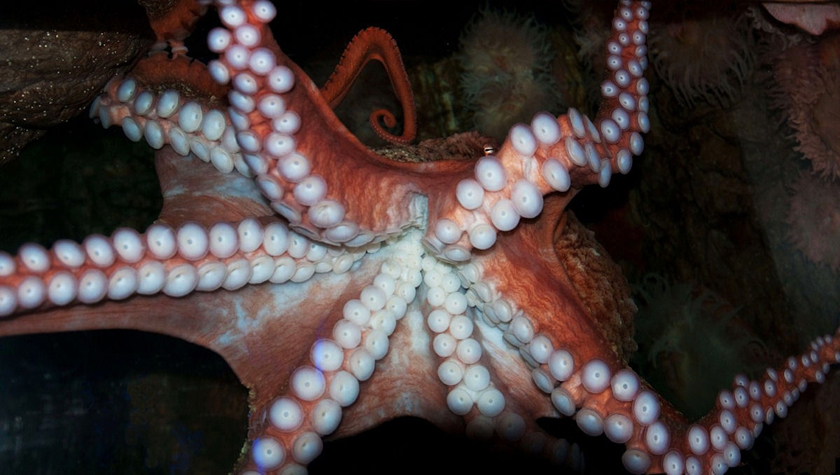
Octopus Karma greets Sy with open arms. Photo: Tianne Strombeck.
Octopuses are hot right now. First of all, today is World Octopus Day (of course a celebration of eight-armed creatures would be marked on the eighth). There have also been a slew of new research projects—one showing that octopuses can practically see with their skin, for instance. And there have been discoveries too. You might have seen recent photos of a new species of octopus so cute, tiny, pink, and big-eyed, that part of its proposed scientific name is “adorabilis.”
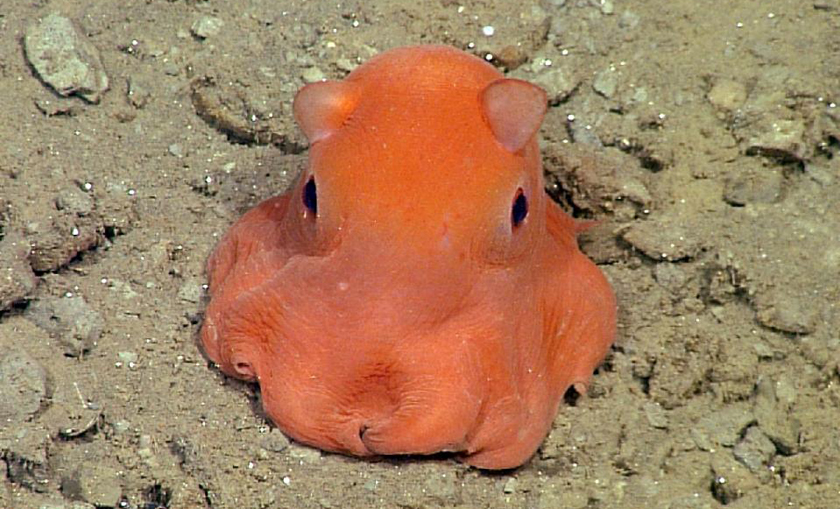
The flapjack octopus could be renamed Opisthotheusis Adorabilis. Photo courtesy of Monterey Bay Aquarium and Research Institute.
At the center of much of this octopus talk, though, is a new book—“The Soul of an Octopus,” by my friend, nature writer Sy Montgomery. It’s a National Book Award contender, and it shows just how surprising these creatures are at every turn. For starters, as Sy points out, octopuses are mollusks—like clams and snails—and yet they don’t have shells.
They’re smart—but most of their neurons are in their arms, not their brains.
Their tongues are covered in teeth. They can squirt ink. And they possess venom like a snake’s.
You might not think of them as lovable, but they have three hearts.
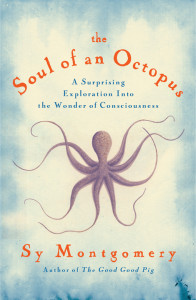 Their boneless bodies allow them to shape-shift—100-pound octopuses can pour themselves through openings no bigger than an orange—making them the Houdinis of aquariums.
Their boneless bodies allow them to shape-shift—100-pound octopuses can pour themselves through openings no bigger than an orange—making them the Houdinis of aquariums.
Their blood is blue, not red like ours, because copper, not iron carries their oxygen.
Most surprising is something that Sy explores in depth—that these creatures are intelligent, have personalities, and even emotion. I wanted to see that firsthand, so I met up recently with Sy at the New England Aquarium, in Boston, where she promised to introduce me to one of her brainy cephalopod friends.
In the Aquarium lobby, I saw right away that Sy was wearing her badge of honor: clipped to a lanyard was what she said is the best official ID she’s ever owned. It reads: “Octopus Observer.”
The aquarium was largely where Sy had come to know and love—yes, she says love—a couple of these alien sea creatures.
Her most cherished among the octopuses perhaps was Athena. She was the giant Pacific octopus who had turned a soothing white when Sy made contact with her skin. On nearly every meeting, the octopus would gently caress Sy’s arms, and embrace her in what Sy describes as both a hug and a kiss, a maneuver in which the suckers would leave behind telltale “hickeys.” These, Sy said, she had to explain to her husband when she’d return home at night from her trip into the city.
Athena had died by the time of my visit with Sy, but the aquarium did make another giant Pacific octopus available to us.
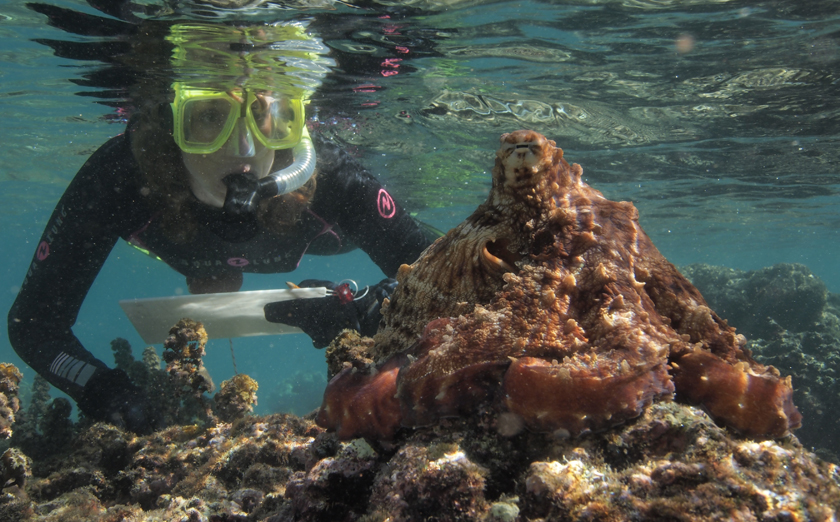
Sy with a wild Pacific day octopus in Moorea. Photo courtesy of David Scheel, Sy Montgomery.
We knew even before meeting her, that Elvira, the Aquarium’s current reigning octopus wouldn’t be in the mood for company. Sy explained it all as we walked toward her tank.
“Well, our octopus is on eggs, so you know she’s very busy,” Sy said, “Once they’re attending to their eggs, of which there might be 100,000, there’s not a lot of space in her heart to interact with us…but we’ll certainly meet her.”
“Their skin is capable of tasting as well as touching. All of their skin including their eyelids.” -Sy Montgomery
I wondered what the aquarium would do if all those eggs hatched, and Sy told me not to worry—these eggs had not been fertilized. “There was no Mister Octopus so that’s not going to happen,” she said.
I know this kind of octopus can weigh 150 pounds and stretch 20 feet from the tips of outstretched arms. But Elvira looked small—she’s about 45 pounds and super strong—a big sucker can lift 30 pounds each, and she’s got more than a thousand of them.
She was on guard, as she has been for months, balled up in the upper left hand corner of her tank, protecting all those eggs, each of which is only the size of a grain of rice.
As we approached, Sy sweet-talked the octopus.
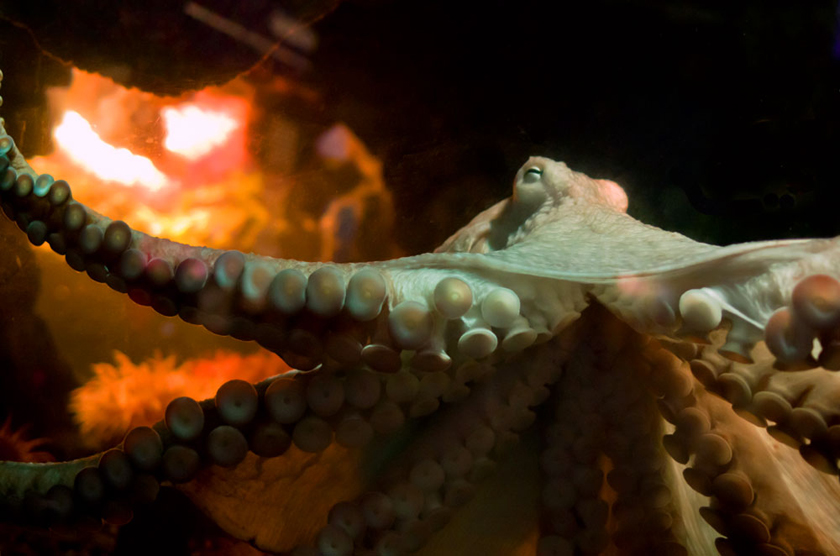
Elvira in her tank. Photo: New England Aquarium.
“Hi pretty girl…how’s my mama? Sweet octopus mama…”
Elvira was nearly motionless. Octopuses don’t live very long—only about five years. And guarding these eggs will occupy the rest of her days.
But to Sy, even in this state, Elvira was a wonder.
“She looks really calm,” Sy said to me. And then she admired Elvira’s coloring. “She’s kind of pink. Her suckers are always that wonderful creamy white color.”
“If an octopus loses an arm? That severed arm can go off and do stuff…it can even hunt prey. But then it tries to pass it back to the mouth, which is now nowhere near it.” -Sy Montgomery
I wanted a better look, so we headed upstairs, into the staff-only room, which gives access to the top of the octopus tank. The big, bright space was filled with buckets and tanks, and pipes. It was also vibrating with the hum of equipment, and the soft whoosh of the artificial tide that sweeps waves of water through one of the nearby tanks.
Now, we could really see down into Elvira’s world. She wasn’t very hungry these days because of her condition, but we would try feeding her, and, sure enough, she did snatch the squid offered to her on a pole.
Just seeing her boil up to the surface like this was a reminder that octopuses do things that seem simultaneously creepy and amazing. It has a lot to do with their arms. It’s more than just the number of them that astonishes—it’s that each one seems to have a mind of its own. Literally.
An octopus carries a coconut shell then gets inside. Well, they are in the mollusk family. Rohit Chadha/YouTube.
“Three-fifths of their neurons are in their arms,” Sy told me. “And if an octopus loses an arm? That severed arm can go off and do stuff…it can even hunt prey. But then it tries to pass it back to the mouth, which is now nowhere near it. But that’s OK, because the octopus can just grow a new arm.”
Octopuses can change more than just the color of their skin—which we know can turn red with emotion, or whiter when the animal is calm. But they can flash spots or stripes, and make their skin smooth or raised with horns or warts. More than that, their skin—especially at the suckers—has an ability we might like ours to have when we are choosing items at a buffet. “Their skin is capable of tasting as well as touching. All of their skin including their eyelids.” Sy told me.
In captivity, people provide enrichment for these intelligent creatures. The animals can open child-proof caps on medicine bottles, and they also enjoy Lego and Mr. Potato Head games.
For Sy, though, clearly, the octopus is more than a list of gee-whiz attributes. Though she is always for the underdog in her nature writing, this one may seem at the outer limits—an animal especially far from being the kind most of us would want to hug.
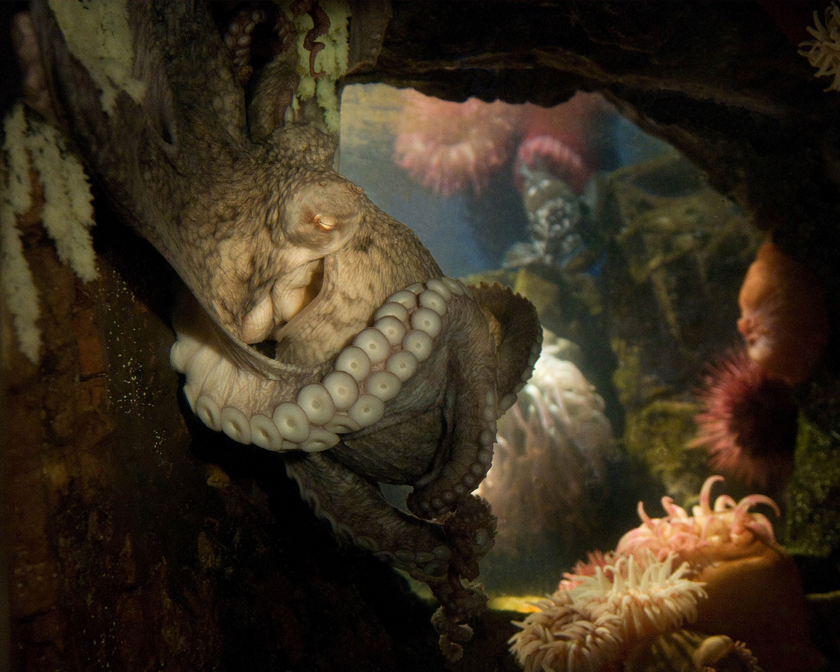
Octavia guards her eggs. Photo: Tianne Strombeck.
I asked her what it is that she connects so deeply with, what common ground she finds with these other-worldly sea creatures. She said among other things, what touches her is that they recognize individuals—human individuals—and respond to them in different ways. Regularly squirting water at some, caressing others. As she got to know octopuses, she said, they were getting to know her.
“These animals, as alien as they are, are very intelligent. And even though their lives are so different from ours—they live just a few years, they’re not a social species—it’s possible, I’ve found to find a connection with an octopus. To make friends with an octopus, and that’s why I titled the book ‘The Soul of an Octopus.’ Because I found they were very soulful, intelligent, emotional creatures. And I came to consider several of them my friends.”
